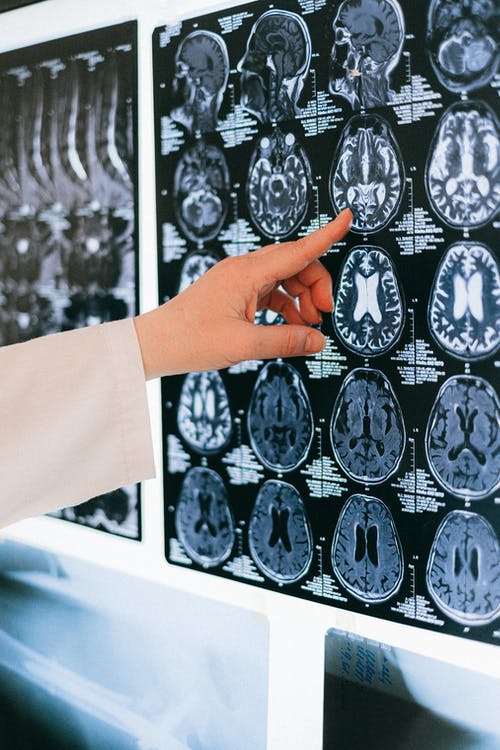*** Note: This blog was written by our former Director of Marketing Preston Simmons.
A healthy brain is essential to a healthy life and to overall mental wellness. The brain is the organ where all of our thoughts and voluntary actions are formed to make decisions every day. Because mental health support is one of our main focuses, we at Peace360 encourage everyone to maintain a healthy and active lifestyle in order to achieve their full potential and be mentally healthy. Today we will talk about three tips to maintain a healthy brain that anyone can implement into their life (tip categories retrieved from the Cleveland Clinic).
1. Nutrition
Cholesterol is key to learning and memory
“The brain has a higher cholesterol content than any other organ… 25% of the body’s cholesterol resides within the brain… when it breaks down, it is recycled into new cholesterol right in the brain” (DENT Neurological Institute). High-cholesterol foods that are easily accessible at the local supermarket include “eggs, cheese and yogurt” (Kubala). These foods can be incorporated throughout the day into one’s diet. For example, eggs could be a part of breakfast, yogurt could be eaten as part of a snack during the day and cheese could be incorporated as an ingredient for lunch or dinner.
Hydration
“It takes only 2% dehydration to affect your attention, memory and other cognitive skills” (Albin). In order to avoid dehydration, how much water should an individual drink per day? The Mayo Clinic suggests: “about 15.5 cups (3.7 liters) of fluids a day for men and about 11.5 cups (2.7 liters) of fluids a day for women” (Mayo Clinic Staff). Hydration is very important for brain health and brain health is extremely important to maintain mental wellbeing. The brain functions that were previously mentioned allow us to accomplish tasks, work, study, participate in leisure activities and nourish social relationships.
2. Sleep
Sleep is vital to conserving a healthy and functioning brain because it allows us to recover from the previous day and to physically and mentally prepare for the next day. What is a healthy amount of sleep for children, teenagers and adults per night?
- “School-age children… 6 to 13 years-old… should sleep for a total of 9-11 hours every day” (Suni).
- “Teenagers aged 13–18 years should sleep 8–10 hours” (CDC Staff).
- Adults should “sleep for 7 to 9 hours per night” (Olson).
Whichever category an individual falls into, advice for a healthy sleep schedule that I have found works includes laying down in a dark, quiet environment 15 to 30 minutes before you would like to go to sleep, limiting caffeine intake and using a yellow night mode screen feature on your phone, laptop or tablet at night.
3. Mental Fitness
Continuing to engage and challenge our brains allows us to increase our cognitive functioning and is a great way to prioritize our mental health by participating in productive activities that will give us a sense of accomplishment. Tips for mental fitness from the Health and Human Services based in Victoria, Australia include:
- “Read often and read widely”. Articles about a wide range of topics can be found on the internet and are almost always free.
- “Take up a new hobby”. Hobbies may require a financial investment depending on the activity, but the sense of enjoyment and satisfaction of learning a new skill will outweigh the cost.
- “Engage in stimulating conversations”. These types of conversations are a great ways to learn new information and socially connect with friends and family.
Conclusion
Your life satisfaction will increase as you care for yourself physically and mentally since physical and mental health are interconnected. We hope you found these tips helpful and that you will be able to implement them into your life in order to improve your brain health!
————————————————————–
This Friday, January 22nd at 9:00am (Pacific Time), our Friday Focus on Facebook Live will be about self-labeling and labeling others. We hope to see you there! Click on the links below to follow us on social media!
Facebook: Peace360 Initiative
Instagram: Peace360 Initiative
References
- DENT Neurological Institute – 22 Facts About the Brain | World Brain Day | DENT Neurologic Institute (dentinstitute.com)
- Albin, D. – 72 Amazing Human Brain Facts (Based on the Latest Science) | Be Brain Fit
- Kubala, J. – 11 High-Cholesterol Foods — Which to Eat, Which to Avoid (healthline.com)
- Mayo Clinic Staff – Water: How much should you drink every day? – Mayo Clinic
- Cleveland Clinic – 6 Pillars of Brain Health – Healthy Brains by Cleveland Clinic
- Eric Suni – How Much Sleep Do Babies and Kids Need? | Sleep Foundation
- CDC Staff – Sleep in Middle and High School Students (cdc.gov
- Eric J. Olson – How many hours of sleep are enough? – Mayo Clinic
- Health and Human Services– 10 tips to improve your mental fitness – Better Health Channel



Comments are closed